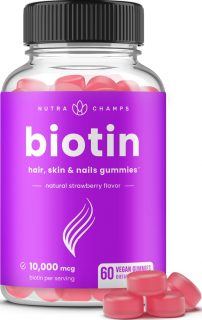Also known as vitamin H, biotin is a water-soluble B-complex vitamin that is essential to the body’s effective functioning. Directly translated to “life” or “sustenance”, this vitamin is very important to various bodily functions, ranging from the regulation of cholesterol levels to promoting the production of keratin.
Longevity Benefits of Biotin
1. Regulating Metabolism Levels
Biotin plays a vital role in how the body processes food and transforms it into energy. Regular consumption of biotin can help regulate and improve metabolism levels in the body since it uses fats, proteins, and carbohydrates consumed and converts them into energy. It is very significant in metabolic pathways including gluconeogenesis, amino acid catabolism, and fatty acid synthesis.
2. Lowering Cholesterol Levels
Research has shown that biotin can lower levels of LDL (bad) cholesterol and increase levels of HDL (good) cholesterol. This makes it effective in not only reducing inflammation and plaque buildup in arteries, but also lowering your risk of strokes, heart disease, and heart attacks.
3. Stabilizing Blood Sugar
Studies have shown that Biotin has the ability to lower blood glucose levels in people with both Type 1 and Type 2 diabetes, through the stimulation of the secretion of insulin. Since this vitamin is also essential to enzyme activity, it plays a role in preventing additional nerve damage in diabetic people.
4. Protecting Your Brain
The brain is more dependent on biotin than any other organ. Along with preventing dementia and Alzheimer’s disease, Biotin keeps your nervous system in working order by assisting with neurotransmitter activity, helping with nerve signals, and preventing inflammation.
Brain inflammation can lead to brain fog, and since this vitamin is known to make the chemicals that allow the bodily nerves to communicate, normal nerve function is dependent on it.
5. Boosts Energy and Mood
Without this vitamin, your body cannot use the energy that you have consumed in the form of food. Biotin and other B vitamins play an important role in converting nutrients into energy, so low levels of it can cause you to feel a serious slump of energy, fatigue, and mood swings.
Recommended Daily Allowance (RDA)
Experts advise that we should be having between 30-100 micrograms of Biotin per day. One can find various Biotin supplements (which are also vegan-friendly) at a lot of physical and online stores.
While most people can handle biotin supplements, a few report mild side effects, including nausea and digestive issues. Luckily, you can obtain enough biotin from a healthy, balanced diet.
Foods High in Biotin
- Egg yolks: Eggs aren’t just packed with B vitamins, proteins, iron, and phosphorus. The yolk is especially rich in Biotin. However, ensure that your egg is cooked fully, as egg whites contain a protein called Avidin, which can interfere with biotin absorption if eaten raw. A whole, cooked egg provides 33% of your RDA for Biotin.
- Sweet Potatoes: As one of the best vegetable sources of Biotin, these are full of vitamins, minerals, and fiber. A ½ cup (125 grams) serving of cooked sweet potatoes provides 8% of your RDA.
- Mushrooms: This nutrient-rich fungus is high in biotin, which helps protect it from parasites. Approximately 20 caps (120 grams) of button mushrooms contain nearly 10% of your RDA
- Avocados: As a great source of folate and unsaturated fats, a medium avocado (200 grams) has 6% of your RDA
- Nuts and Seeds: As excellent sources of unsaturated fats, protein, and fiber, most nuts and seeds are great sources of biotin:
- A 28-gram serving of roasted peanuts contains 17% of your RDA
- A 20-gram serving of roasted sunflower seeds contains 10% of your RDA
- A 30-gram serving of roasted almonds contains 5% of your RDA
Other sources of biotin you should incorporate into your diet include bananas, broccoli, salmon, and spinach. It is very important that we consume the recommended daily allowance, as not doing so can lead to a biotin deficiency.
Biotin Deficiency
Although this is a rare deficiency, it can lead to a long list of health risks. Symptoms of biotin deficiency include:
- Brittle nails
- Hair loss
- Fatigue
- Dry eyes
- Red rashes on the skin
- Insomnia
- Fatigue
- Loss of appetite
- Changes in the intestinal tract
- Muscle pains
- Depression
- Anxiety
Biotin: Nature’s Power Food
From regulating your blood sugar levels to promoting healthy hair, skin, and nails, biotin is extremely crucial to our health and well-being. However, biotin is water-soluble, meaning the body doesn’t store it. This is why it is important to consume just the right amount of biotin, since any extra biotin will simply pass through your body when you urinate, which makes taking too much of it a waste.
Medications such as antibiotics and anti-seizure drugs can limit the body’s absorption of this vitamin, so keep these factors in mind when you begin consciously implementing Biotin into your lifestyle, and always consult with your doctor before taking any supplements.
MAIN IMAGE CREDIT:Visual Stories || Micheile on Unsplash
References
- Godswill, A.G., Somtochukwu, I.V., Ikechukwu, A.O. and Kate, E.C., 2020. Health benefits of micronutrients (vitamins and minerals) and their associated deficiency diseases: A systematic review. International Journal of Food Sciences, 3(1), pp.1-32.
- Williams, G.R., Cervinski, M.A. and Nerenz, R.D., 2018. Assessment of biotin interference with qualitative point-of-care hCG test devices. Clinical Biochemistry, 53, pp.168-170.




![women [longevity live]](https://longevitylive.com/wp-content/uploads/2020/01/photo-of-women-walking-down-the-street-1116984-100x100.jpg)










